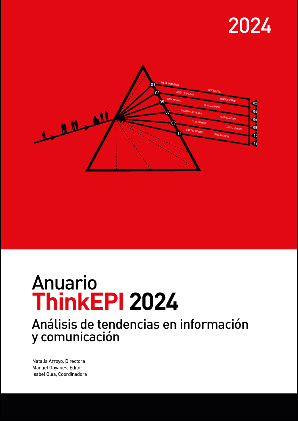All roads lead to Rome: Copyright, artificial intelligence, and the media
DOI:
https://doi.org/10.3145/thinkepi.2024.e18a15Keywords:
Intellectual property, Copyright, Artificial intelligence, EU Artificial Intelligence ActAbstract
The emergence of artificial intelligence, although it is not new and has been applied in media newsrooms at least since 2014, has experienced a great growth since the commercialization of systems such as ChatGPT, starting at the end of 2022. This increase in the production of content and training of artificial intelligence systems through the massive use of external data has caused very serious issues to be raised about the extent to which current copyright legislation will be able to respond to new challenges. The media, and to a lesser extent the professionals, have used three legal instruments to face these challenges: the reform of the laws, including the approval of a European Directive on artificial intelligence; litigation; and negotiate with large companies involved in the development of artificial intelligence systems, such as OpenAI.Downloads
References
Caswell, David (2024). How media managers think AI might transform the news ecosystem. Oxford: Reuters Institute for the Study of Journalism. https://reutersinstitute.politics.ox.ac.uk/news/how-media-managers-think-ai-might-transform-news-ecosystem
Dell’Acqua, Fabrizio; McFowland, Edward; Mollick, Ethan R.; Lifshitz-Assaf, Hila; Kellogg, Katherine; Rajendran, Saran; Krayer, Lisa; Candelon, François; Lakhani, Karim R. (2023). “Navigating the jagged technological frontier: Field experimental evidence of the effects of AI on knowledge worker productivity and quality”. Harvard business school technology & operations Mgt. Unit Working Paper No. 24-013. https://doi.org/10.2139/ssrn.4573321
Díaz-Noci, Javier (2024). Artificial intelligence, copyright law, other related legal aspects, and the digital news. Dublin: Centre for Digital Policy, University College Dublin. https://digitalpolicy.ie/wp-content/uploads/2024/05/AI-copyright-law-and-digital-news.pdf
Elondou, Tina; Manning, Sam; Mishkin, Pamela; Rock, Daniel (2023). “GPTs are GPTs: An early look at the labor market impact potential of Large Language Models”. Working paper. https://arxiv.org/pdf/2303.10130.pdf
Fernández-Carballo-Calero, P. (2022). 25 things you should know about artificial intelligence and copyright. Pamplona: Thomson Reuters-Aranzadi.
Fu, Angela (2023). “As AI enters newsrooms, unions push for worker protections”. St Petersburg Florida: Poynter Institute. https://www.poynter.org/business-work/2023/artificial-intelligence-writers-guild-unions-journalism-jobs
Gaon, Aviv H. (2021). The future of copyright in the age of artificial intelligence. Cheltenham: Edward Elgar. ISBN: 978 1 83910 314 8
Geige, Christophe; Vincenzo, Laia (2023). “Generative AI, digital constitutionalism and copyright: Towards a statutory remuneration right grounded in fundamental rights”. Kluwer Copyright Blog, October 19. https://copyrightblog.kluweriplaw.com/2023/10/19/generative-ai-digital-constitutionalism-and-copyright-towards-a-statutory-remuneration-right-grounded-in-fundamental-rights-part-2/#:~:text=In%20this%20case%2C%20where%20the,generated%20outputs%20and%20human%20creativity
Gervais, Daniel J. (2002). “Feist goes global: A comparative analysis of the notion of originality in copyright law”. Journal of the Copyright Society of the U.S.A. n. 49, pp. 949-981. https://ssrn.com/abstract=733603
Ginsburg, Jane C.; Budjardio, L. A. (2019). Authors and machines. Berkeley technology law journal, 34, pp. 343-456. https://doi.org/10.15779/Z38SF2MC24
Guadamuz, Andrés (2017). “Artificial intelligence and copyright”. WIPO Magazine. https://www.wipo.int/wipo_magazine/en/2017/05/article_0003.html
Hui, Xiang; Reshef, Oren; Zhou, Luofeng (2023). The short-term effects of generative artificial intelligence on employment: Evidence from an online labor market. https://doi.org/10.2139/ssrn.4527336
Krausová, Alžběta; Moravec, Václav (2022). “Disappearing authorship: Ethical protection of AI-generated news from the perspective of copyright and other laws”. JIPITEC, pp. 133-144. https://www.jipitec.eu/archive/issues/jipitec-13-2-2022/5540
Lee, Karen; Molitorisz, Sacha (2021). “The Australian News Media Bargaining Code: lessons for the UK, EU and beyond. Journal of media law, v. 13, n. 1, pp. 36-53. https://doi.org/10.1080/17577632.2021.1963585
Lombardi, Claudio (2023). “Rethinking journalism protection: looking beyond copyright”. Journal of media law, v. 15, n. 1, pp. 90-120. https://doi.org/10.1080/17577632.2023.2234691
Lu, Bingbin (2021). “A theory of ‘authorship transfer’ and its application to the context of Artificial Intelligence creations”. Queen Mary journal of intellectual property, v. 11, n.1, pp. 2–24. https://doi.org/10.4337/qmjip.2021.01.01
OMPI (2018). “Artificial intelligence and intellectual property: an interview with Francis Gurry”. WIPO Magazine. https://www.wipo.int/wipo_magazine/en/2018/05/article_0001.html
Senftleben, Martin (2023). “Generative AI and author remuneration”. International review of intellectual property and competition law, n. 54, pp. 1535-1560. httsp://doi.org/10.2139/ssrn.4478370
Trapova, Alina; Mezei, Peter (2021). Robojournalism – A copyright study on the use of artificial intelligence in the European news industry. GRUR international, v. 71, n. 7, pp. 589-602. https://doi/10.1093/grurint/ikac038
Vogler, Daniel; Eisenegger, Mark; Fürst, Silke; Udris, Linards; Ryffel, Quirin; Rivière, Maude; Schäfer, Mike S. (2023). Artificial intelligence in news production: perception and acceptance among the Swiss population. Zürich: Research Center for the Public Sphere and Society (fög) / University of Zurich.
Downloads
Published
How to Cite
Dimensions


